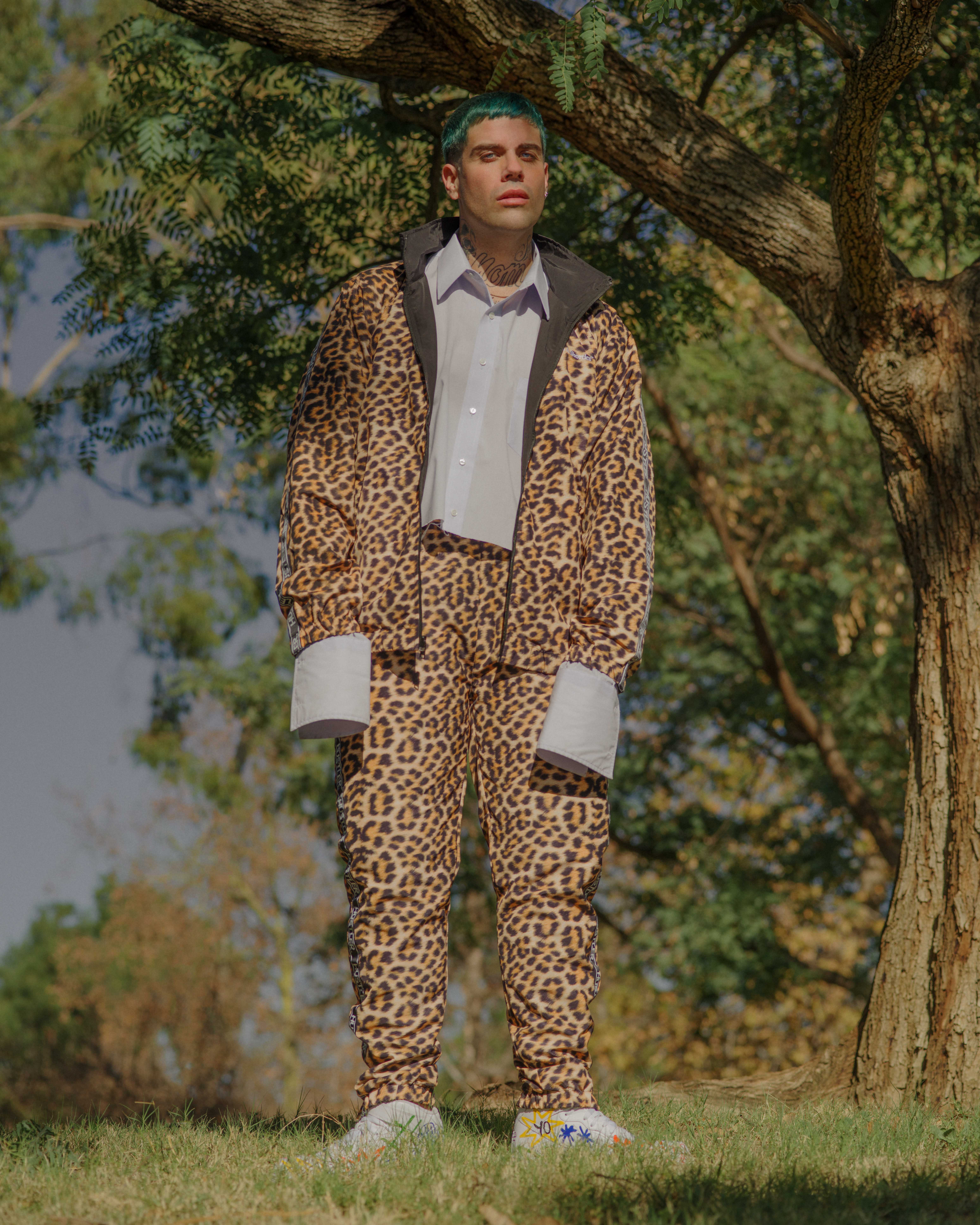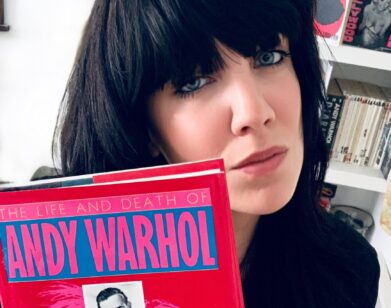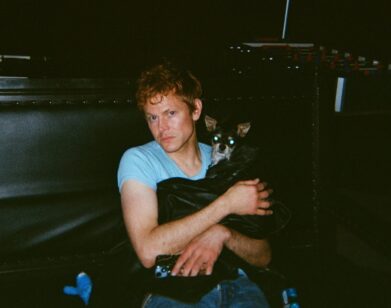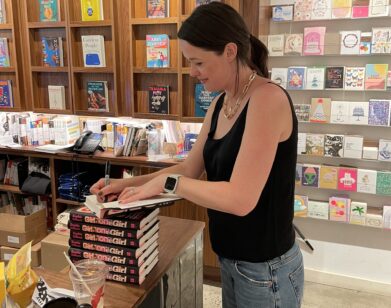Life after Britney: why hit songwriter Jesse Saint John is going solo
Anyone with a name like Jesse Saint John seems destined for pop stardom. Yet for the last few years, the L.A.-based songwriter has mainly worked behind the scenes at Sony’s HQ, crafting hits and racking up songwriting credits for A-listers like Britney Spears (“Love Me Down”), Charli XCX (“Cloud Aura” feat. Brooke Candy), and Camila Cabello (“Something’s Gotta Give”). Now, amidst the exciting uncertainty that is music in the age of streaming, he’s chosen to pivot into the spotlight and strike it solo.
Saint John’s debut single “Move,” released recently, is an adrenaline rush of a song with shades of The Ting Tings, Uffie, and The All-American Rejects. It’s bombastic, hedonistic, whimsical and totally sure of itself, a blast of flavorful pop-rock ear candy that makes me wish I was of legal age in 2005, so I could’ve experienced these sounds on the dance floor with a can of Sparks in my hand.
In an Instagram post announcing his solo career, Saint John writes, “I never thought I’d release my own music because I’m not easily categorized or summed up by a short sentence.” It’s true: his career to date eludes categorization. He studied theater, made a cameo in both the music video for Grimes’s “Genesis” and “Pool Party,” a video work for artist Ed Fornieles, and acted as rapper Brooke Candy’s de facto hype man and collaborator.
Being a successful songwriter requires a distinct form of embodiment as someone else, enhancing another artist’s vision and ultimately delivering an authentic product to the masses. Now, Saint John is crafting his own glittery nook in the pop sphere, without adapting his vision to anyone.
IVAN GUZMAN: Are the feelings of being a solo artist what you expected?
JESSE SAINT JOHN: I mean, I love it. It doesn’t feel that different yet just because the song came out recently, but it’s definitely a lot to wake up to in one day. It’s been amazing. I could not believe the amount of support I was getting. I would’ve loved to have done this sooner. I’m so grateful. But it doesn’t feel that different yet. It’s just like, here’s another song. I get this rush when my songs come out that I’ve written for other people, so this is a different yet similar rush, which I’m excited about. I’m waiting for the downsides.
GUZMAN: “Move” has major replay value. When did you know that this song was “the one”?
SAINT JOHN: I wrote it to potentially pitch to other people just to see who else would want to sing it. Then the more that I listened to it and kept replaying it myself, I started to get addicted to it. I feel like if I ever was to do an artist project, this would be my song, which I’ve never felt before. I kept singing it, and it was perfectly in the range that I like to sing in. It just felt right. I knew that I would be proud to show this to people and be like, “This is my first single.”
GUZMAN: It feels very mid-to-late 2000s. What were some direct influences?
SAINT JOHN: I was inspired by Passion Pit, MGMT, Yeah Yeah Yeahs, Uffie … I love that whole bloghouse era, with people combining genres and using the internet to gain traction for their music. That day when I was working with Tim Pagnotta, who is the producer and has done stuff for Walk The Moon and Neon Trees, and we were talking about bloghouse music and Passion Pit, and when I brought up Uffie, he was like, “Who’s Uffie?” I was like, “Oh my God, I have to show you Uffie right now, you’re gonna die.” This girl was amazing. And he was like, “Okay, I get the vibe, let’s do a song like this today.” And I said, “But who would sing it?” And he was like, “Who cares? Let’s just make the song and find out who will sing it later.” So we made “Move” and figured out who would sing it later.
GUZMAN: Was there a specific moment you realized you wanted to go solo? Was it always the goal? Never the goal?
SAINT JOHN: It was never my goal. My major occupation is a songwriter. So whenever I would go into the studio to write for other people, producers would be like, “Why aren’t you an artist? You have this artist energy, and it seems like we would be writing for you.” And I was like, “No, I’m not an artist, I’m just a writer.”
I love the process of writing for other people and picking their brains and figuring out what they want to say, helping them … And I do styling and creative direction, so I was super happy to be behind the scenes and allow the other artists to shine. This song changed that for me. I could see myself being proud to go out and promote this and start performing it and stuff. I was just like, “I need to get back out and perform.” And there’s nothing I love more than doing it live.
GUZMAN: I feel like as a pop songwriter, you’re in a position where you have a lot of distinct knowledge about the music industry. What did you think about Quincy Jones’s viral interview?
SAINT JOHN: I love him. I would strive to get to that point where you can just be that candid. I can’t say I’ve read the whole thing, but I’ve read the excerpts and the things people are really reacting to. And I applaud him. I wish people were more candid, although I also understand that you have to work to that point to become that candid. I think if he did that interview, say, 40 years ago, he would be blacklisted and people would be like, “He’s spilling too much tea.” But at this point he has literally nothing to lose. He’s beyond a legend. I think it’s incredible, and I’m obsessed. I want that to happen every day.
GUZMAN: What’s the most surprising thing about the songwriting industry?
SAINT JOHN: I think how much unused material there is. That would shock literally anybody. If you think about it, there are hundreds of songwriters, and of those hundreds there are maybe 50 who are really doing it every day and getting those cuts on big projects that people want to be on. So even if those 50 of us are writing 365 days a week, there’s only so much material that actually comes out.
It would shock people how much great, incredible, beautiful, life changing music is just sitting on the cutting room floor. It’s kind of sad, but it’s also the nature of the business and everything happens for a reason. I’m happy with all the work that I do whether it comes out or not, but you’d be surprised how many songs I’ve heard that live on a hard drive and I’m like, “This sounds like a number one song.”
GUZMAN: I mean, Carly Rae Jepsen said she wrote over 250 songs for her last album.
SAINT JOHN: And I did one with her for EMOTION that didn’t come out, and it was so good. But she couldn’t have picked better songs because EMOTION is one of the great American albums of the last 10 years.
GUZMAN: So true.
SAINT JOHN: What an icon, really.
GUZMAN: When you’re writing for other artists, do you have to separate your own personal taste from that of the artist you’re writing for?
SAINT JOHN: I think there’s a perfect combination. At a certain point, you separate yourself and you’re like, “I wouldn’t say that, but I’m not the one singing this song so I’m happy to do that with you.” I think you’re there for a reason. You’re with that artist because they trust your taste and are excited to get what you are able to offer for them, so it’s the perfect balance. I always say, “Don’t do a song for somebody else that you wouldn’t give to yourself, and don’t do a song for yourself that you wouldn’t be proud to give to someone else.”
GUZMAN: Is there a specific artist or writer you’ve worked with that you had an instant connection with?
SAINT JOHN: I’ve been lucky to find my tribe of writers that I connect with incredibly, but the first time I felt that amazing connection was with Sia. She was one of the first sessions I ever had with somebody else. When I was in there with her, it gave me the validation as a songwriter of, “Okay, I’m doing this right.” Because I came up in such an unconventional way, but when I got in the studio with her, I was like, okay, she’s a real songwriter and we are trading lyrics and melodies toe-to-toe.
GUZMAN: I want her to be my life mentor.
SAINT JOHN: I’m just so lucky to even have her stored in my phone. It really taught me that you can be one of the most successful artists in the industry and still be an incredibly kind, generous, open person, which I was nervous about when I first entered the industry.
GUZMAN: There seems to be an influx of queer men coming up within the songwriting industry, the obvious one that comes to mind being Justin Tranter. What do you think about that, and do you think that being queer helps you excel in developing another person’s vision?
SAINT JOHN: Now, it’s just sort of a non-issue, thankfully. It’s funny because there is this concept of, “Oh, now there are so many gay songwriters,” but there’s still only about a handful of us that we can name, you know? Before there were zero, and now there’s six or something. It’s great, and I’m so grateful and excited and would love to see it diversified even more.
But I do think that my queerness is one of my superpowers, and I’m excited to write from my perspective. I don’t think it defines my writing style or anything just because I don’t even know how it would define your writing style. Some of the greatest songwriters of all time are queer, and the additional perspective of growing up with feelings of being different and almost being the underdog in a way, it gives you that much more drive to excel and write from the perspective of somebody who feels like a bit of an outsider, which everybody does at some point. It’s cool to express that energy. It doesn’t translate into every song, but it seeps its way in one way or another.
JESSE SAINT JOHN’S DEBUT SINGLE “MOVE” IS OUT NOW.







